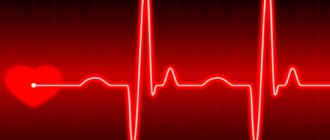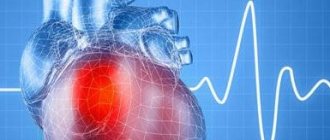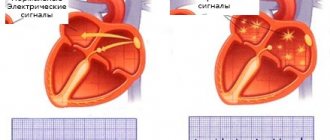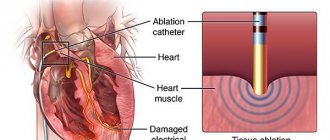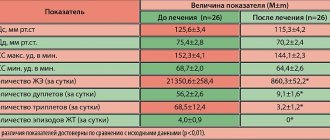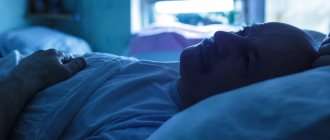The natural physiological state of “sleep” occurs every 24 hours throughout a person’s life. Its entire period covers 5 stages and begins with “slow”. At first, a person is drawn to sleep, then brain activity decreases, and internal processes slow down.
Your heart rate changes during sleep. During the dreaming period, the body is cleansed, tissues and organs are restored, and energy accumulates. This means that healthy sleep makes the necessary reboot of the entire body for the next day’s activity.
What affects a sleeper's heart rate?
Pulse is one of the types of biomarkers, relying on its indicators to determine the general condition of the human body. At the time of sleep, jerky oscillations in the artery decrease, the functions of the cardiovascular system slow down, and metabolic processes weaken. Cells require less oxygen.
This process regulates the activity between organs, some are stimulated, others, on the contrary, arrive in complete relaxation. Heart rate and intensity are affected by:
- gender identity;
- age;
- physical state.
The more trained a person is, the lower the heart rate reduction. For men, the difference is considered to be in the range of minus 5-10 beats. In children, compared to the older generation, pulsation increases by 25-30 beats/minute.
Tachycardia at different times of the day
Since rapid heartbeat can occur due to physical activity, emotional reactions or behavioral habits (smoking, drinking too much strong coffee, etc.), an increase in heart rate only during the daytime is not considered a reliable symptom of heart pathology (although it should be alarming).
If tachycardia persists at night, this indicates the presence of pathology. At this time, the heart rate slows down due to physiology, and if the heart rate does not decrease during sleep, remaining consistently high throughout the day, it is necessary to visit a doctor.
At the same time, some pathologies are characterized by daily fluctuations in heart rate. For example, during the day a person may feel tachycardia, but when going to bed at night, they feel the opposite - the heart rate drops below normal, which also leads to problems with sleep, decreased oxygenation and shortness of breath. This condition may be a sign of sick sinus syndrome (SSNS), namely tachycardia-bradycardia syndrome. With this pathology, all symptoms of tachycardia, disturbing during the day, intensify at night due to a drop in heart rate below 60 per minute.
Attacks of tachycardia, related to the time of day, are potentially life-threatening: episodes of dizziness and fainting can result in injury, especially in children and the elderly. Such symptoms are a reason to visit a doctor
Reasons for changing frequency
Changes in heart rate are provoked by certain physiological conditions:
- drinking alcohol, coffee drinks, certain medications;
- hard physical labor and training in sports complexes;
- emotional impulses (experience, fear, fright, joy, stress).
A hot climate changes body temperature and causes an increased heart rate. At night, biorhythms slow down by 1.5 times, and at 4 am the lowest parameters are observed. This is due to the functioning of the vagus nerve, which suppresses the functioning of the cardiovascular system. The pulse during sleep in an adult can reach up to 30 beats/minute. Most often, the risk of a heart attack occurs between 4 and 6 hours.
Important! It is necessary to pay attention to the number of beats per minute on the left and right hands; if they differ, it means that blood circulation in the limbs is impaired.
The body gradually enters a state of rest, the brain sends signals about the upcoming rest. Before going to bed, the pulse ranges from 55-60 beats/minute, but this is if the person falling asleep is in a non-irritated state and does not have heart disease. Complete peace occurs in the first phase of the dream and in the early morning, the frequency of pulse vibrations is low.
Heart rate slows down slightly before bed
Preventing heart rate changes
In order to prevent changes in heart rate not associated with diseases, it is recommended:
- reduce stress during the day;
- dedicate at least half an hour every day to moderate physical activity;
- before going to bed, do relaxing breathing exercises an hour before bed (exhalation is longer than inhalation), a slow walk, a warm bath or shower are useful;
- Dinner should be served 4 hours before bedtime, it should not contain fatty and spicy foods, drinks with caffeine, 45-60 minutes before you can drink 2/3 cup of kefir or yogurt, eat 50 g of low-fat cottage cheese;
- two hours before a night's rest, stop watching movies and using electronic gadgets;
- stop smoking and drinking alcohol in the evening.
For patients with pain in the heart area or attacks of palpitations, interruptions of these measures are not enough; they need to take medications to prevent heart rhythm disturbances.
We recommend reading the article about why there is pulsating in the ear. From it you will learn about the causes of pulsating tinnitus, as well as methods for diagnosing and treating pulsating tinnitus.
And here is more information about what provokes a low pulse with high blood pressure.
During sleep, your heart rate slows down by 7-9% compared to daytime levels. It can be measured by counting beats on the radial artery with outside help or using a fitness bracelet, but to detect rhythm disturbances you need an ECG in 24-hour monitoring mode.
Normal for an adult during sleep
Wakefulness is a stage of life with high activity of organs, tissues, and cells. Everything is in a running mechanism, the pulse is actively beating. Rest and dreaming are the opposite of wakefulness, which implies a weakening of all sources of energy in the body.
The process of slowing down arterial impulses begins to be observed at the moment a person is sent to the kingdom of Morpheus. Studies by medical scientists have found that during wakefulness the pulse should be 8-10% stronger than at rest. However, everything depends on other factors: age, gender, psychological and physical aspects.
Impact on heart rate of sleep phases
Human behavior during the day has several phases that replace each other and thereby affect the pulse. At night the same thing happens, depending on the sleep phase (there are 5 in total), the pulse changes. The intensity varies from highest to lowest, and vice versa.
In the first four phases of the dream, gradual relaxation and deepening of sleep occurs. The heart muscle begins to contract more slowly, and the pulse also slows down. This is the majority of normal sleep, approximately 80%.
Fifth stage of sleep
The phase is a parameter of REM sleep, when a person dreams, at this time physiological processes change. In particular, an emotional reaction occurs that provokes cardiac impulses with an increase in the frequency of beats per minute. It is even possible to exceed normal levels of wakefulness.
Also in this phase, other physiological processes can be launched:
- increased breathing;
- sweating;
- body movement.
This also provokes an increase in pulse impulses. If you are not dreaming or the person is dreaming with pictures of a calm genre, the pulse will be stable throughout the night, without fluctuations. If we talk about the ideal pulse, then 70 beats/minute is the most favorable indicator that confirms the normal heart rate of a healthy person.
Israeli scientists believe that a decrease in heart rate during sleep increases the risk of death several times. Their verdict is that you can live with this frequency of contractions for only 7 years.
Numerous studies prove that people with extra pounds, obesity, diabetes, and hypertension are susceptible to slowing down their heart rate.
Heartbeat
The human pulse is a rhythmic oscillation of blood vessels that corresponds to the contractions of the heart. That is why the condition of the heart muscle is judged by their frequency. For example, the pulse can be used to characterize the strength and rhythm of the heartbeat and even the condition of the vessels through which blood flows. If the pulse loses its rhythm - it either becomes too fast, or slows down, or even begins to respond at irregular intervals - doctors begin to worry and check the patient for heart pathology, susceptibility to stress, or hormonal imbalances. Often, such failures can be a response to excessive coffee consumption.
Related article: My heart skipped a beat. When an arrhythmia becomes deadly Pulse indicators depend on many different criteria. For example, its frequency and even strength will be determined by a person’s age, exposure to environmental factors, and physical activity. The pulse also depends on the gender of a person: according to statistics, women knock more often than men. Children's heart rate will be significantly faster than adults'. This is especially true for babies.
As a rule, changes in the number and force of impacts are determined by various pathological processes. But there are a number of physiological reasons that can slightly reduce or speed up the heartbeat. So, for example, among them:
- Meals. After eating, a person’s heart rate often increases
- Inhalation height. Here the pulse also accelerates somewhat
- Changing body position, like physical activity, leads to an acceleration of the rhythm
- An increase in room temperature causes the heart to contract more often, because the blood thickens and more strength and energy is required to pump it
- Dream. Activity slows down during this time
In all these cases, if there is no pathological component, the pulse returns to normal quite quickly: 15 minutes is enough.
Increased heart rate during sleep
Reducing the impulses of the cardiovascular system during rest is considered natural for a healthy person. Medical experts confirm the dependence of heart rate rhythms on the effectiveness of sleep, its depth and quality.
In most cases, sleeping people see dreams in color or black and white. Beautiful and pleasant dreams periodically change to nightmares, which affect the nervous system. The result may even be a jump in blood pressure. But this is not the only thing that affects the quality of dreams.
Tachycardia in the morning
Heart rate fluctuations during sleep can also cause:
- changes in the functioning of the thyroid gland;
- prolonged stress and depression;
- impaired blood circulation;
- slagging of the body and intoxication;
- internal bleeding;
- lack of water in the body.
Tachycardia harms proper sleep, causing anxiety with possible headaches and pressing pain in the chest.
Help with panic attacks
A person suffering from panic attacks at night cannot correctly assess his condition. Often waking up with a feeling of fear and anxiety is perceived as an ordinary nightmare, so they are in no hurry to seek help. But such episodes are becoming more frequent, and my health is getting worse. If panic attacks occur during sleep, treatment should only be prescribed by a psychiatrist or psychotherapist. At the initial consultation, the doctor collects an anamnesis. Only sincere answers and a confidential conversation with a doctor will help you make a correct diagnosis and choose the optimal therapy. The main goal of conversations with a doctor is to learn to quickly recognize your panic attack and, over time, learn to cope with it, learn to help yourself, gain personal experience of successfully overcoming, coping, and thereby minimize the risk of its reoccurrence.
For a sleep panic attack, symptoms and treatment vary. With a high level of anxiety, as well as with severe or frequent attacks, a course of anti-anxiety (anxiolytic) drugs has a good effect. Medicines are selected individually, and only with the consent of the patient.
If a panic attack occurs in a dream, how to deal with it without pills?
At the onset of the disease, relaxation and muscle relaxation techniques help to quickly calm down and normalize the nervous system. This is taught in psychotherapy sessions. Breathing techniques, therapeutic hypnosis, and cognitive behavioral psychotherapy are also effectively used.
Individual and then group psychotherapy is an important stage in the treatment of panic attacks. A person needs to figure it out and understand what makes up his individual causes of anxiety attacks during the daytime. Learn to respond adequately to various stressful situations. Find your own individual regimen that makes up a healthy lifestyle, strictly follow the recommendations of your doctor. Only in this case will the prognosis be favorable.
Indicators after waking up
The morning hours are the calmest, the time when people wake up in a peaceful state. But the pulse, both in adults and in children, is observed to be rapid. This is a completely normal situation due to a sudden awakening. After 5-10 minutes, the pulse beats normalize and stabilize.
After waking up, the body's functions switch to daytime mode and begin their activity. If the pulse quickens, this may be the result of restless dreams, which are most often caused by stress, anxiety, emotional arousal, or indicate cardiac problems responsible for blood circulation.
Cardiologists do not recommend a sharp rise to a vertical position; this puts a lot of stress on the heart muscle. Natural recovery consists of a gradual awakening; after waking up completely, you need to lie down for a few minutes to restore cardiac functions.
There are situations when, after waking up, weak pulse beats are observed. In order to raise them to a normal level, they do morning exercises and yoga. A pulse of 40 beats per minute is a reason to consult a doctor.
Athletes and those who are actively involved in physical education have larger hearts than those who are indifferent to training. This is due to the fact that the heart is a muscular organ. With moderate loads, it increases in size, as a result, it safely pumps blood, which normalizes blood pressure. The most important thing is that it strengthens the entire cardiovascular system.
What should your heart rate be before bed?
Your heart rate before bed should be between 60-90 beats per minute. The same indicators are the norm for a state of rest during the daytime. To avoid the influence of changes in body position, you must first lie quietly for 5-7 minutes, and only then measure your pulse rate. Before going to bed, it is more convenient to use a stopwatch with a sound signal when taking measurements.
When waking up after sleep
Before waking up after a night's sleep, the pulse rate increases, as the inhibitory effect of the cerebral cortex weakens and the work of the adrenal glands is activated. With vegetative-vascular dystonia, patients may experience rapid heartbeat in the morning. This is not dangerous; to restore normal rhythm, you need to lie down for 5-7 minutes after sleep and avoid sudden changes in body position.
How to measure a sleeping person's pulse
There are several ways to check the pulse rate of a sleeping person. The first is the traditional pressing of the fingers on the wrist and counting the number of blows. You can ask a close relative who will measure your pulse in different phases of sleep.
Another way is a modern heart rate monitor device with a built-in alarm clock. Its functions are to count the rhythmic beats of the arteries. During sleep, the device reads various indicators related to the body:
- reflects the position;
- draws up schedules;
- records sleep phases and number of beats.
A heart rate monitor is a device that allows you to measure your heart rate during sleep.
Then it analyzes all the collected data and determines a favorable time to wake up, which gives a signal to the built-in alarm clock to vibrate. The “heart rate monitor” is a great way to determine the quality of sleep and check the functioning of the cardiovascular system at rest. These are also analytical system indicators that reflect the health of a sleeping person.
How to measure
The traditional method of measuring pulse is to place two fingers on a person's neck or wrist. It is worth understanding that for various problems, the pulse can appear in unexpected and varied places. So, if a person has aortic valve insufficiency - this is a situation when the valve leaflets do not close completely - the pulse can be viewed through the pupils of the eyes. If there are problems with blood vessels, if there is a failure in the communication between veins and arteries, the veins may pulsate. If blood pressure increases, you can feel the pulse in the abdomen.
You can also feel the pulse in the foot, groin, armpit and forearm. Learning to feel your pulse yourself is not that difficult. This can help save a person’s life, because you can describe to the doctor the strength and speed of heart contractions even at the stage of calling an ambulance. Naturally, if a person has problems with the pulse, he should not expect that the problem will solve itself, and there is also no need to practice self-medication. In such a situation, you should consult a doctor as soon as possible to determine the source of the problem and cope with the situation.
| Person's age | Average heart rate (beats per minute) | Minimum allowable heart rate (beats per minute) | Maximum allowable heart rate (beats per minute) |
| Newborn babies up to 1 month of age | 140 | 110 | 170 |
| Children from 1 month to one year | 132 | 102 | 162 |
| Children 1-2 years old | 124 | 94 | 154 |
| Children 4-6 years old | 106 | 86 | 126 |
| Children 6-8 years old | 98 | 78 | 118 |
| Children 8-10 years old | 88 | 68 | 108 |
| Children 10-12 years old | 80 | 60 | 100 |
| Teenagers 12-15 years old | 75 | 55 | 95 |
| 15-50 years | 70 | 60 | 80 |
| 50-60 years | 74 | 64 | 84 |
| 60-80 years | 79 | 69 | 89 |
Baby's pulse in sleep
A growing child's body develops with significant differences in pulse rate between daytime and evening. To determine the accuracy of a child’s pulse, you should measure pulse impulses at the same time for two days. To do this, the child is put to bed and the pulse is checked during the dream, relying on the following points:
- Measurement of pulse beats on both wrists - the indicators should be the same. If there are deviations, this indicates a circulatory disorder or is a sign of a disease.
- If a child has a high temperature due to a cold, then this factor must be taken into account when measuring; pulse vibrations will be much more frequent.
Age-related changes also affect the heart rate, which affect many processes in the body of babies. First you need to compare your pulse during the day, then take a measurement at night. Your heart rate should be lower during sleep.
Average normal heart rate values for children during sleep
The average values for parents' orientation when measuring children's pulse at night are given:
| Child's age | Impact range/minute | Average beats/minute |
| from 1 to 3 months. | 100-155 | 120 |
| from 4 to 12 months. | 90-150, | 110 |
| 2 years | 82-140 | 105 |
| 3 years | 80-120 | 90 |
| 4 years | 78-118 | 90 |
| 5 years | 75-110 | 85 |
| 6 years | 75-90 | 84 |
| 7 years | 75-82 | 78 |
| from 8 - 9 years | 73-78 | 76 |
| from 10 -11 years | 70-75 | 73 |
Forecast by heart rate
“For a long time, the normal pulse rate was actually considered to be 60-80 beats per minute,” says cardiologist, professor, vice-rector for regional development and head of the Department of Hospital Therapy No. 1 of the Moscow State Medical and Dental University Yuri Vasyuk. “But recently large studies have been conducted in which hundreds of thousands of people were observed over several decades. As a result, it turned out that in healthy people the optimal heart rate is 55–60 beats/min. If the heart beats faster or slower, it increases the risk of a number of cardiovascular diseases.
Article on the topic
Dangerous cough. What atypical symptoms indicate a heart attack? A study of heart rate in diseases of the heart and blood vessels has shown that the higher it is, the higher the risk of heart attacks, strokes and other cardiovascular complications, including death from such diseases. Therefore, increased heart rate began to be officially considered an independent risk factor. Now a rapid heart rate is on a par with other risk factors for cardiovascular disease - smoking, high cholesterol, obesity, diabetes, high salt intake, etc.
As a result, scientists have revised the heart rate norms, and today it is believed that in patients with coronary heart disease, the pulse should be less than 70 beats/min, with arterial hypertension and chronic heart failure - less than 80 beats/min. If it is higher, the risk of complications and death increases significantly. Therefore, getting your heart rate below these values is one of the goals of treatment, as is reducing high blood pressure, cholesterol and other risk factors.
There is an explanation for these effects. The faster the pulse, the shorter the diastole - this is the time the heart muscle rests between heart contractions. It is in diastole that 90–95% of the blood flows to it. The lower the contraction frequency, the longer the diastole and the more oxygen the heart receives.
With arterial hypertension, the heart's need for oxygen increases, because it works with increased load, pushing blood into narrowed peripheral arteries. Because of this, hypertrophy of the heart muscle develops, and it requires even more oxygen and nutrients.
There is a hypothesis according to which any heart is programmed for a certain number of contractions. Accordingly, the lower the heart rate, the longer it can actively work. But it is confirmed only for heart rate in the range from 55 to 70–80 beats/min, and a decrease below 55 has the same unfavorable effect on the prognosis as an increase of more than 70–80 beats/min.”
Off the beat. How to restore heart rhythm Read more
When deviations from the norm are acceptable
Deviations from the normal heart rate during sleep in adults are allowed if certain factors are present.
Age
Over time, a person’s physical fitness decreases, and the condition of the cardiovascular system worsens. This results in a higher heart rate during sleep in older people. At the same time, the norm for women is 7 shocks higher than the readings for men.
Fitness level
The normal heart rate during sleep is 60-80 beats per minute. Trained people, athletes, thanks to constant exercise, achieve changes in the heart muscle.
It works more efficiently and releases more blood with one contraction. As a result, the heart rate becomes lower both at rest and during physical activity.
Environmental conditions
In the body, as a self-regulating system, under certain conditions, the cooling mechanism automatically turns on. So, when the surrounding air heats up, a person’s temperature rises. At the same time, the vessels expand, heat transfer increases, and as a result the body cools. But to speed up blood circulation, the heart begins to contract more often: the pulse increases.
When the body enters low temperatures, the opposite process occurs: vasoconstriction, slowing down blood flow and reducing pulsation.
Dehydration
Lack of fluid in the body leads to a decrease in the amount of blood due to its thickening. To provide tissues with oxygen, the heart begins to work more intensely, and the pulse increases. After replenishing the lack of fluid in the body, the rhythm returns to normal.
Genetics
Heredity has a strong influence on heart rate. Among similarly trained peers, the difference in heart rate can reach 20 beats per minute.
Why does it become more frequent?
During sleep, when the brain is active, people often see colorful dreams. These can be either good dreams or nightmares. It is because of them that the heart rate increases. There is probably no person who has not at least once woke up in a cold sweat with a rapid heartbeat. It happens that because of nightmares, a person is thrown out of sleep when falling asleep, and at the same time his pulse increases.
Seeing this kind of dream can increase not only your pulse, but also your blood pressure. By waking up and lying down for a few minutes, trying to relax, you can reduce your heart rate to normal. A high pulse during sleep in an adult indicates that either you had some kind of vivid dream and your brain began to work actively, or you have diseases of the cardiovascular system, and even in sleep the heart does not slow down, but works actively .
Heart rate may also increase at night due to the following reasons:
- dysfunction of the thyroid gland;
- anemia;
- nervous emotional state for a long time;
- poisoning;
- heart failure;
- internal bleeding;
- dehydration.
When a person suffers from colds or infectious diseases, his body temperature rises. This is the body’s protective reaction to an external aggressor – microbes. By increasing body temperature, the body tries to destroy viruses and microbes, and in this condition the pulse will increase during sleep. A high heart rate at night often leads to insomnia, since it is quite difficult to fall asleep with a strong heartbeat. This phenomenon can be triggered by regular nervous tension, insufficient rest, conflicts in the family or at work, physical fatigue, abuse of medications or harmful substances.
High rhythm after sleep
Both adults and children often experience a high heart rate in the morning after sleep. But a little time passes - 10-15 minutes, and the pulse rhythm begins to return to its normal norm. This condition is considered quite common in a healthy person. The body wakes up, and gradually all systems begin to work. Jumping right out of bed puts a sharp strain on the heart, so doctors recommend lying down for 10 minutes after waking up to normalize your heart rate after sleep.
It is extremely rare that after waking up, a decreased pulse may be observed; to increase it, it is enough to do light morning exercises.
The heart is a muscle like all the others in the body, and it simply needs constant moderate physical activity. Light exercise in the morning will keep the heart muscle toned and normalize its rhythm.
An increased heart rate after sleep indicates that either the person had a restless sleep due to nervous experiences, or it is worth checking their cardiovascular system with a cardiologist. To lower your heart rate, it is recommended to lie quietly for a few minutes and try not to think about the bad and the things of the next day.
